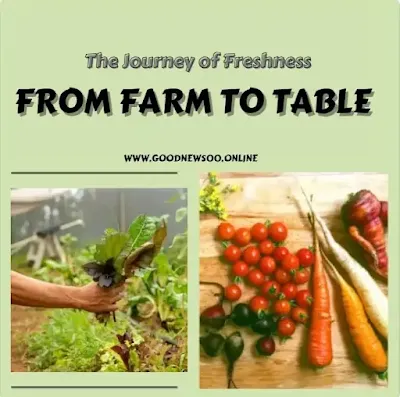The Journey of Freshness: Exploring the from-Farm-to-Table Movement"
In today's fast-paced world, where convenience often takes precedence over quality, a quiet revolution is taking place: the farm-to-table movement. This culinary philosophy, rooted in the principles of sustainability, transparency, and community, is reshaping the way we think about food—from its origins on the farm to its journey to our tables. In this exploration, we delve into the essence of the farm-to-table movement, uncovering its origins, its impact on food culture, and its promise for a more sustainable and flavorful future.
The Roots of Farm-to-Table
The farm-to-table movement finds its roots in a desire to reconnect with the source of our food and to celebrate the bounty of the land. Dating back to the 1960s and 1970s, when the back-to-the-land movement and the rise of environmental awareness sparked a renewed interest in organic farming and sustainable agriculture, the farm-to-table ethos has since evolved into a full-fledged culinary movement embraced by chefs, farmers, and consumers alike.
At its core, the farm-to-table philosophy emphasizes the importance of seasonal, locally sourced ingredients, grown and harvested with care and respect for the environment. By shortening the distance between farm and fork, farm-to-table practitioners aim to minimize the carbon footprint of their food, support local farmers and artisans, and preserve the integrity and flavor of fresh, seasonal ingredients.
The Rise of Farm-to-Table Cuisine
The rise of farm-to-table cuisine has been fueled by a growing awareness of the environmental and health implications of conventional industrial agriculture. As consumers become more conscious of the origins and production methods of their food, they are increasingly seeking out restaurants, farmers' markets, and community-supported agriculture (CSA) programs that prioritize sustainability and transparency.
In recent years, farm-to-table cuisine has become synonymous with the farm-to-fork movement, which emphasizes the importance of traceability and accountability in the food supply chain. Chefs and restaurateurs committed to the farm-to-table ethos work closely with local farmers and producers to source the freshest, highest-quality ingredients available, often featuring seasonal specials and tasting menus that showcase the diversity and richness of regional cuisine.
Furthermore, the farm-to-table movement has inspired a renaissance in traditional culinary techniques and heritage ingredients, as chefs rediscover the flavors and traditions of their local terroir. From heirloom vegetables and artisanal cheeses to pasture-raised meats and wild-caught seafood, farm-to-table cuisine celebrates the unique flavors and textures of each season, inviting diners on a journey of discovery and delight.
The Impact of Farm-to-Table
The impact of the farm-to-table movement extends far beyond the confines of the kitchen. By fostering closer connections between farmers, chefs, and consumers, farm-to-table practices promote greater transparency and accountability in the food system, empowering consumers to make informed choices about what they eat and where it come from.
Moreover, the farm-to-table movement has significant environmental benefits, reducing the carbon footprint of food production and distribution by minimizing the distance traveled from farm to plate. By supporting local farmers and artisanal producers, farm-to-table practitioners help to preserve farmland and biodiversity, protect natural resources, and promote sustainable land stewardship practices.
Furthermore, the farm-to-table movement has profound social and economic implications, revitalizing rural communities, creating new opportunities for small-scale farmers and producers, and fostering a sense of connection and belonging among consumers. By supporting local food systems and investing in the future of agriculture, farm-to-table advocates are laying the groundwork for a more resilient, equitable, and sustainable food system for generations to come.
The Future of Farm-to-Table
As we look ahead to the future of the farm-to-table movement, the possibilities are endless. With consumer demand for sustainable, locally sourced food on the rise, we can expect to see the farm-to-table ethos continue to influence culinary trends and dining preferences in the years to come.
Moreover, as advancements in technology and agricultural practices continue to reshape the food landscape, we can anticipate new innovations and collaborations that further enhance the sustainability and accessibility of farm-to-table cuisine.
From vertical farming and aquaponics to regenerative agriculture and food waste reduction initiatives, the farm-to-table movement is poised to embrace new tools and techniques that promote environmental stewardship and food justice.
In conclusion
The farm-to-table movement represents a return to the roots of our food traditions—a celebration of the land, the people who cultivate it, and the flavors that emerge from its bounty.
By embracing the principles of sustainability, transparency, and community, we can create a more resilient, equitable, and flavorful food system that nourishes both body and soul.
As we savor the fruits of the farm-to-table revolution, let us remember the profound impact that our food choices have on the world around us and the role that each of us plays in shaping the future of food.


Comments
Post a Comment